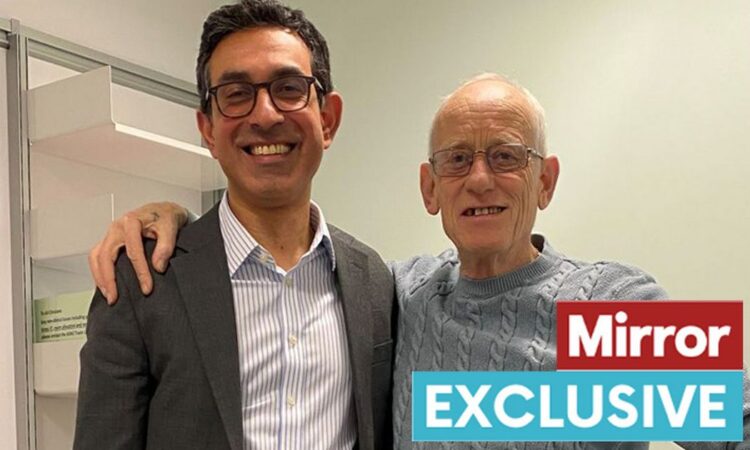
The operation was guided by a hair-thin fibre optic cable threaded all the way up through an artery and could eventually help thousands of men at risk of fatal aneurysms
A grandad has become the first Brit to undergo pioneering surgery to keep blood flowing through his heart.
The operation was guided by a hair-thin fibre optic cable threaded all the way up through an artery from his groin and could eventually help thousands of men at risk of fatal aneurysms.
Retired printing company owner Kevin Dowd saw surgeons use the tiny camera to remotely repair a potentially deadly aneurysm inside his aorta high in his chest cavity.
The aorta is the largest artery and carries blood out from the heart.
An aneurysm forms when a portion of the aorta weakens causing a bulge, which can be fatal if it bursts.
Such ruptures kill around 6,000 people a year in England and Wales but from now can be fixed with much less invasive surgery.
Kevin, 72, from the Isle of Sheppey in Kent, said: “They told me when it bursts you have just 40 seconds then you’re dead.
“I had no symptoms and they only discovered mine because I have regular heart scans due to a bypass I had ten years ago.
“They said instead of using X-rays they wanted to use fibre optics to guide them, I would be the first person in Britain and would I be ok with that.
“I said ‘someone’s got to be a guinea pig, so why not me?.”
Abdominal aortic aneurysms (AAAs) affect one in every 25 men aged over 65 and often show no symptoms.
A team at London’s at Guy’s and St Thomas’ Hospital led by top vascular surgeon Prof Bijan Modarai became the first in the UK to repair an AAA guided by fibre optic cable carrying a tiny camera.
A stent graft is also inserted which provides a new lining in the aorta, sealing above and below the bulging area to exclude the aneurysm.
These highly complex procedures in the blood vessels, known as endovascular procedures, have until now been guided by a painstaking process of repeated X-rays which pose a radiation risk to the patient and medical team.
The other alternative was full open chest surgery which also carries risks.
Kevin said: “If they don’t go up through your aorta the other option is open surgery where they cut open your rib cage from top to bottom, stretch it open to expose your aorta.
“There was two of us on the ward and the other guy had the more invasive surgery and afterwards he looked absolutely dreadful.”
Despite developing a temperature after the operation, Kevin was fit to be discharged in ten days. It is now two months since he had the procedure.
“I feel absolutely fine now,” he added.
“I do gardening and I’m halfway through painting my house. I’m going on walks every day. It’s made me feel a lot more energetic.
“And I’m still alive, which is the main thing.”
The fibre optic technology, developed by the company Philips, produces high quality images that enable surgeons to operate more quickly and safely.
They could one day be the norm for any endovascular surgery to repair diseased blood vessels.
Guy’s and St Thomas’ is one of nine centres in Europe and the USA using the pioneering technology.
Prof Modarai said: “It’s very exciting to have fibre optic technology.
“It means that complex endovascular procedures can be done with less requirement for x-rays which is safer for the patient and our teams.
“The 3D anatomical visualisation of the patient also gives us a more intuitive workflow, which could mean faster procedures.”
Around 100,000 men have AAA and the condition is around three times more common in males.
Cutting blood pressure and quitting smoking can reduce your risk of developing the condition.






